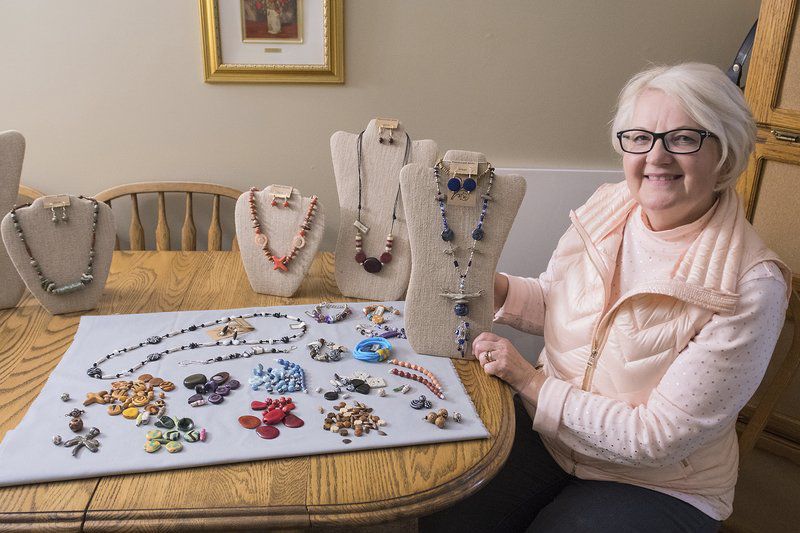By Deanna B Narveson
The Free Press, Mankato, Minn.
WWR Article Summary (tl;dr) In 2009, Paulette Bertrand helped start the Mankato Area Fair Trade Town Initiative, which helps promote the sale of sustainable, ethically produced products in Mankato.
The Free Press, Mankato, Minn.
Pieces from all over the globe come together in each of Paulette Bertrand’s necklaces, and no two are alike.
There are beads made of paper from Uganda, shiny ceramic pieces from Kenya, round wooden beads from the Philippines, silver from Colorado and flat, vibrantly colored beads from South America. All of them are fair trade certified.
“I started making jewelry about 20 years ago because I had a job that I had to travel,” said Bertrand, of Mankato, who now sells her pieces online and at craft shows under her Fair Chic brand name.
She was hopping planes back and forth for her work as a graphic designer and making jewelry in airports, and slowly her small hobby business grew.
While at a craft fair in Milwaukee, she stumbled across a dealer who sold ceramic Kazuri beads, made by a World Fair Trade Organization in Kenya that provides jobs for women in towns around Nairobi.
“That just fascinated me, and I thought, you know there’s so much jewelry out there, so I want my jewelry to be unique,” Bertrand said.
Each pattern on the Kazuri beads is made by a different woman. Bertrand said she started to look for more and more fair trade beads. She got paper beads from Outreach Uganda and flat beads made from rain forest nuts. Her favorite necklaces have birds and giraffes on them and use deep blue and purple beads.
In 2009, Bertrand helped start the Mankato Area Fair Trade Town Initiative, which helps promote the sale of sustainable, ethically produced products in Mankato. In 2011, Mankato earned the title of Fair Trade Town in Minnesota from Fair Trade Town International.
“Fair trade is about leveling the playing field when it comes to farmers and artisans,” Bertrand said. “People think fair trade products just come out of developing countries, but it’s really all over.”
She made a necklace recently with blue beads and a silver pendant made by a group in Colorado that helps people with disabilities gain employment, she said.
“What I try to do is make something that is beautiful but that also provides income for people,” Bertrand said.
She can list the ways that fair trade certified organizations and goods help people. Outreach Uganda uses part of their proceeds to help communities and built a health clinic in 2013, according to Outreach Uganda’s website.
Filipino beads are made from wood that is harvested ethically and regulated by the Filipino government.
Owner of Mary Lue’s Yarn & Ewe, Peggy Grey said she feels like it’s important they carry fair trade certified products, including felt bags from Tibet.
“Our shop is fairly women oriented. We like to support women and women-based businesses,” Grey said. “Fair trade certified products often support women and communities.”
At INdiGo Organic, manager Jasmine Bartlett said for their business it’s about making sure everything that goes into people’s bodies or on their skin and hair is safe and organic.
“Everything is grown and comes straight from the source,” Bartlett said. “Fair Trade, for us, is about making sure that people get equal pay, that their welfare is taken care of and that they aren’t working with products that are dangerous.”
Making jewelry and other goods is just a hobby for Bertrand, but because she is retired, she spends a good bit of time working with MAFTTI, she said. She and other MAFTTI members catalog the places where people can buy fair trade products in Mankato, and Bertrand designs their quarterly newsletter.
“We like to get a deal. Unfortunately, that is oftentimes on the back of someone else,” Bertrand said. “Every time they purchase something, they make a choice. They really make a choice as to what kind of a world they want to live in.”
She said people should know that they can make a difference. Even if the impact seems small, each small decision adds up, Bertrand said.
Fair Trade retailers
Mary Lue’s Yarn & Ewe, INdiGo Organic, Aldi, Jo-Ann Fabric & Crafts, Sam’s Club, Kohl’s, Hy-Vee, Cub Foods, CVS Pharmacy, Coffee Hag, Walmart, Target, Walgreen’s, The Fair Emporium in St. Peter and New Ulm’s Own all sell at least a few fair trade certified goods. Fair trade goods are marked with a label.














































































































































































































































































































































































